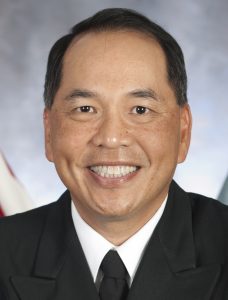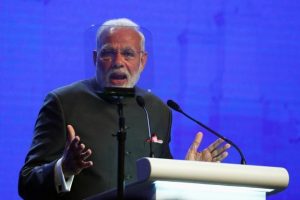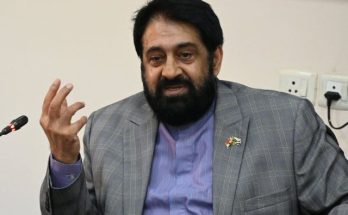 Amid ongoing churn and realignments in the Indo-Pacific geopolitical landscape, the Shangri-La Dialogue in Singapore (May 31-June 2, 2018) renewed the world’s spotlight on pressing issues facing the region and dangers to freedom of navigation in South China Sea.
Amid ongoing churn and realignments in the Indo-Pacific geopolitical landscape, the Shangri-La Dialogue in Singapore (May 31-June 2, 2018) renewed the world’s spotlight on pressing issues facing the region and dangers to freedom of navigation in South China Sea.
Manish Chand, Editor-in-Chief of India and World magazine and India Writes Network, caught up with Pete Gumataotao, Director of Daniel K. Inouye Asia-Pacific Centre for Security Studies, to discuss a host of interconnected issues that impinge directly or indirectly on peace, stability and prosperity in the Indo-Pacific region. In this wide-ranging conversation, Rear Admiral (retd) Gumataotao, who heads the influential Department of Defense organization dedicated to advancing security cooperation in the region, speaks about the US’ relentless commitment to the Indo-Pacific region and to upholding freedom of navigation.
Alluding to speeches by India’s Prime Minister Narendra Modi and US Defence Secretary James Mattis at the Shangri-La Dialogue, Rear Admiral (retd) Gumataotao underscores the key role of India and the US in maintaining a rules-based international order to shape an inclusive Indo-Pacific region. He also underlined the centrality of ASEAN and countries like Vietnam in protecting this rules-based order and in upholding freedom of navigation against the backdrop of widespread anxieties sparked by China’s militarization of artificial islands in South China Sea.
Rear Admiral (retd) Gumataotao has extensive experience operating in the Asia-Pacific region during 37 years of active duty service, including eight years as a U.S. Navy flag officer. As Commander of Nimitz Carrier Strike Group, he directed the multi-national exercise ‘Rim of the Pacific’ in 2012.
(Excerpts from the interview)
MC: Prime Minister Narendra Modi delivered a defining policy speech on India’s perspective on the Indo-Pacific region at the 2018 Shangri-La Dialogue. When he spoke about an inclusive Indo-Pacific, what do you think he was aiming at? What was the big message that came out of his speech?
 PG: Prime Minister Modi described the 21st century world insightfully. Issues are not sorted out bilaterally anymore. We need to go beyond a cold war mindset. Multi-polarity is what struck me in his speech.
PG: Prime Minister Modi described the 21st century world insightfully. Issues are not sorted out bilaterally anymore. We need to go beyond a cold war mindset. Multi-polarity is what struck me in his speech.
In his speech, US Defence Secretary James Mattis underlined the importance of the Indo-Pacific region for vital interests of the United States. We realize that India plays a key role in that as well as other countries in the Indo-Pacific region. Both Prime Minister Modi and Secretary Mattis never turned and said ‘nobody is excluded’. But I think both of them talked about security, stability and prosperity. And I think that’s the goal of any country – security, stability, prosperity and free and open Indo-Pacific. Both of them have embraced the idea that if we are to realize the full potential of every individual country as a sovereign nation, we must all cooperate together. That’s why multi polarity and enhanced regional cooperation make a lot of sense.
Secretary Mattis even said that we even work on cooperation with China. But every country — and no country should be excluded, including the United states — should understand that there are international standards and norms. There is a rule of law; it’s the only way we can establish an agreeable framework. Speakers from other countries also stressed on these common shared values which touches on the right for every sovereign nation to strive to establish stability and prosperity to the maximum extent possible. The message that has come out from the Shangri-La Dialogue is that no country stands on itself and no country should take advantage of any other country.
MC: Some experts say that the US’ influence is declining…
PG: What I think is important to highlight is that there is some rhetoric out there that says the United states is diminishing in its influences, but this is just rhetoric, and is not backed by facts.
Check the numbers in terms of investments and check the numbers on the commitment of the United States in the Indo-Pacific region. The US has been in the region for many decades and has worked with ASEAN, North East Asia or even cooperated with countries like India to be able to ensure we have good cooperation and understanding. This cooperation is what leads to peace and stability. This was the point Secretary Mattis highlighted in his address: if we cooperate together and anchor in the principles of free and open Indo-Pacific, there’s much more to agree upon than the differences we have. Common and shared values outweigh differences.
MC: Defence Secretary Mattis also spoke about the possibilities of working with China. The US has a conflicted and complex relationship with China; you continue to spar on some issues, but at the same time you also continue to have strong trade and other kinds of relationships.
How do you look at the alleged militarization of South China Sea? Secretary Mattis had a blunt message for China — the militarization must stop; the coercion and intimidation must stop; otherwise there will be some serious consequences. What is the US’ strategy of to curb what many see as China’s increasing adventurism and aggression in South China Sea?

PG: The United States has already made it clear that it does not want the countries here in the region to choose either China or United States, NO! Far from it, there are many opportunities that every country, if we stay with the rule of law in terms of investments, in terms of prosperity that are there, but at the same time we cannot turn a blind eye and that’s what the United States is saying.
When you talk about the freedom of navigation in the Indo-Pacific, it’s the United States warships. They are very capable warships that can defend themselves. But they are not doing it just for the United States. They are doing it for the entire region, for every country. Every country that cannot defend itself. We are saying that every country has the right to sail international waters and to be able to do their commerce. So, we don’t want to say China is on the other side of it because the United States believes that China has a lot of opportunities — and that’s why Secretary Mattis welcomes cooperation with China. But – and there’s a big but — if China chooses to violate and pursue a strategy of aggression in these artificial islands.
China has chosen to take this aggressive approach like building artificial islands. To be able to do it in these contested waters is surely aggressive. And it challenges other people’s rights to say that who made you the owner of that island. Therefore, we are trying to say is that we do not want China to go unchecked. If China chooses that, they are going against the rule of law, they are going against the free and open principles that many of our countries in the Pacific region including India agreed to. There are, therefore, consequences at many levels. For example, the US has already withdrawn invitation to China for participation in the RIMPAC.
M.C: When Secretary Mattis spoke about serious consequences for China, what will it mean in practical, realistic terms?
PG: It was a strong statement by Secretary Mattis which meant that we won’t turn a blind eye. You see, you say something but you don’t challenge somebody on what they are doing because it’s against the rule of law for everybody and they will continue to do it. This is not the United States perspective. This is from the International Tribunal law. This is from the UNCLOS when they decided that it was not lawful for China to do those things in South China Sea. So, what we are saying to China is that it’s totally unacceptable to go on doing these things in South China Sea, which are against the rule of law and UNCLOS.

M.C: In his speech, Prime Minister Modi underscored the centrality of ASEAN in shaping an inclusive Indo-Pacific region and he also spoke about bolstering capacity of friends and partners like Vietnam? How do you look at Vietnam’s role in countering China’s activities in SCS? What is the US’ strategy as the US has very robust relationship with ASEAN countries?
PG: Secretary Mattis has spoken about the centrality of ASEAN and its role as a key enabler in ensuring that we establish stability in the region. It is because the 10 countries of the ASEAN share values of adherence to the rule of law and respecting sovereignty of every country. But it’s also to promote stability and prosperity in the region. ASEAN would be a good organizational mechanism to resolve this issue of China diplomatically and in many other ways than a military solution. Many different tools that can possibly make China realize that there’s a lot of international consistency of saying that we need to be able to abide by the rule of law and international standards. Vietnam is already playing a role there, but but it just cannot take Vietnam or the Philippines; it like what PM Modi says – we need a multi-dimensional approach to solve some of these issues. But nobody, including the United States, wants to end up in a conflict in the South China Sea because nobody wins. ASEAN centrality is, therefore, a great venue for people to come together, including China, and discuss some of these issues so that there will be no misunderstanding.
Author Profile

- Manish Chand is Founder and Editor-in-Chief of India Writes Network (www.indiawrites.org) and India and World, a pioneering magazine focused on international affairs. He is CEO, Centre for Global India Insights, an India-based think tank focused on global affairs.
Latest entries
 India and the WorldFebruary 17, 2026South-by-South: Focus on people-centric solutions at India AI summit
India and the WorldFebruary 17, 2026South-by-South: Focus on people-centric solutions at India AI summit India and the WorldFebruary 7, 2026Modi hails interim India-US trade deal, Goyal says no concessions made on agriculture
India and the WorldFebruary 7, 2026Modi hails interim India-US trade deal, Goyal says no concessions made on agriculture India and the WorldFebruary 2, 2026Trump announces trade deal with India, Modi ‘delighted’
India and the WorldFebruary 2, 2026Trump announces trade deal with India, Modi ‘delighted’ India and the WorldJanuary 31, 2026Palestinian minister bats for mediatory role for India in ending Gaza conflict
India and the WorldJanuary 31, 2026Palestinian minister bats for mediatory role for India in ending Gaza conflict







